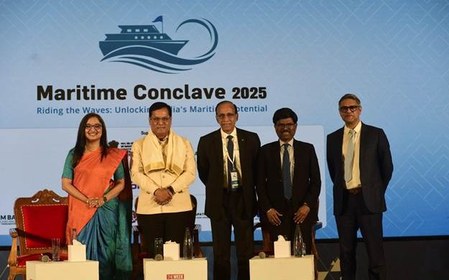

Kochi, Sep 16 (IANS) India is set to attract investments worth Rs 80 lakh crore and generate over 1.5 crore jobs under the “Maritime Amrit Kaal Vision” as the government is harnessing the power of the country’s coasts and waterways with ambitious investments to build the country’s Blue Economy, Union Minister for Ports, Shipping and Waterways Sarbananda Sonowal said on Tuesday.
Addressing a maritime conclave here, he pointed out that the government’s flagship ‘Sagarmala’ programme is driving this change with 840 projects worth Rs 5.8 lakh crore under implementation by 2035. Already, 272 projects worth Rs 1.41 lakh crore have been completed. The upcoming Rs 76,000-crore Vadhavan Port in Maharashtra — envisioned among the top 10 container ports globally — is projected to create 12 lakh jobs. Meanwhile, India’s major ports have reduced turnaround time to 0.9 days, faster than global benchmarks in the US, Germany and Singapore. Nine Indian ports are now ranked among the world’s top 100.
Sonowal said that India’s maritime sector is undergoing a transformative shift, positioning the nation as a future global maritime superpower.
Highlighting the government’s policy environment for the swift implementation of PM Narendra Modi’s maritime vision, the minister said: “Our policy reforms are shaping an investor-friendly environment. With this spirit, after extensive stakeholder consultations in the spirit of cooperative federalism, we recently enacted 5 landmark legislations forever altering the maritime landscape of the nation, establishing a strong, business and environment-friendly, globally aligned legislative framework.”
With the Rs 25,000 crore Maritime Development Fund (MDF), our government has incentivised shipbuilding, given infrastructure status to large vessels, and provided tonnage tax benefits for inland vessels. Together, these are boosting competitiveness and global alignment, he said.
“From ‘No Vision’ of the UPA regime, Prime Minister Modi has given us two ‘Grand Visions’ – The Maritime India Vision 2030 and the Maritime Amrit Kaal Vision 2047. These vision documents have shaped our strategy and planning to spruce up the sector and empower it to become a force multiplier towards propelling the Indian economy to become Viksit Bharat,” Sonowal said.
He further stated that Kerala has emerged as a key driver of this maritime resurgence. The Vizhinjam International Seaport, operational since 2024, is India’s first fully automated transhipment hub and has already handled 10.6 lakh TEUs and nearly 500 ships. Cochin Shipyard — builder of INS Vikrant — is expanding its global footprint in shipbuilding & repair.
On the key role that Kerala plays in India’s ambition of becoming a global maritime power, Sonowal said: “Kerala anchors India’s vision of becoming a maritime superpower by 2047. The Cochin Port and its Vallarpadam transhipment terminal are set for further expansion to accommodate rising cargo flows. Under Sagarmala, 54 projects worth Rs 24,000 crore are being executed in Kerala, of which 20 are already complete. These include modernised fishing harbours at Kochi, Kannur, and Thrissur, providing direct benefits to thousands of fishermen. All of this and more are aimed at harnessing the state’s maritime potential as well as unlocking opportunities to further the larger goal of maritime excellence.”
The Kochi Water Metro — Asia’s largest integrated water transport system — is revolutionising urban connectivity with 78 electric-hybrid vessels connecting 10 island communities. Kerala’s waterways are also being developed as economic corridors. National Waterway 3 and the International Cruise Terminal in Kochi have unlocked tourism and logistics opportunities, with the terminal welcoming 105 cruise ships and 1.4 lakh passengers in just three years, he said.
With India Maritime Week 2025 scheduled in Mumbai this October, the government anticipates stronger international partnerships and fresh investment inflows. Sonowal urged global stakeholders to deliberate on issues such as decarbonisation, supply chain resilience, cybersecurity, and sustainable shipping.
–IANS
sps/vd
